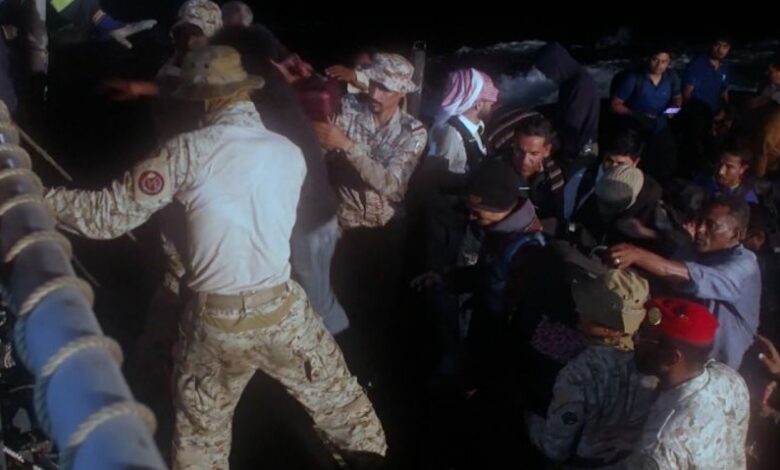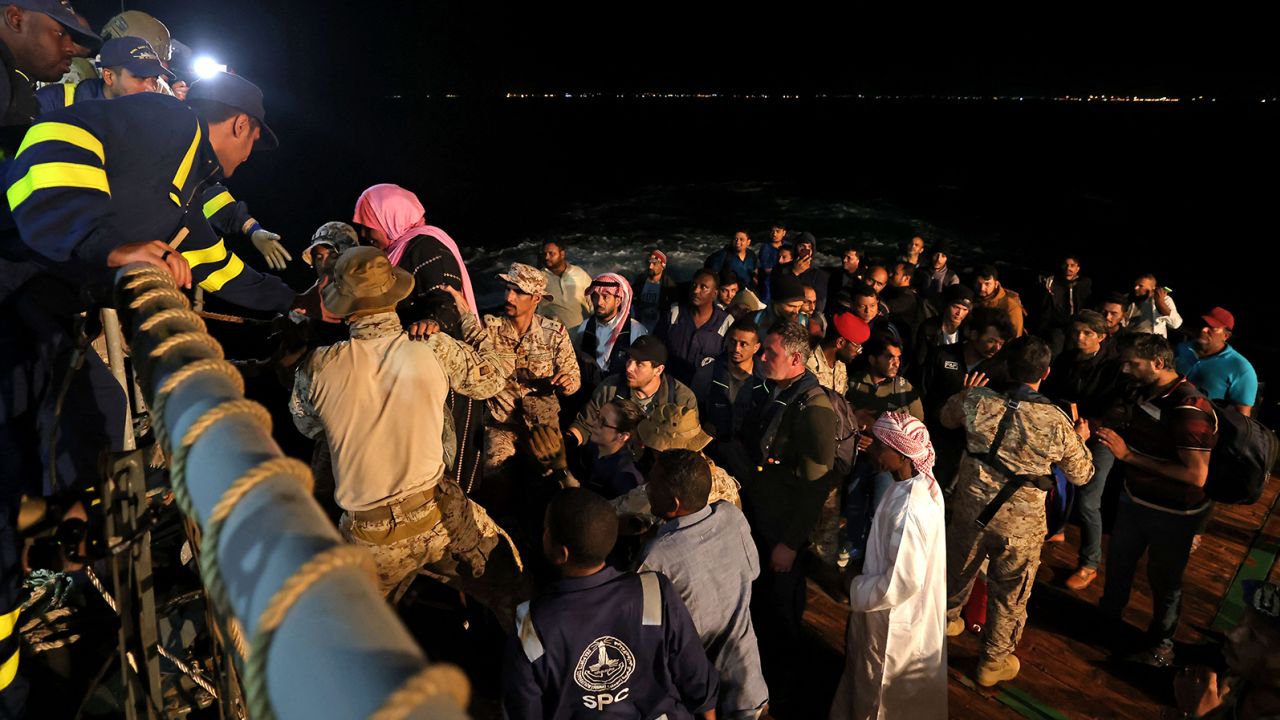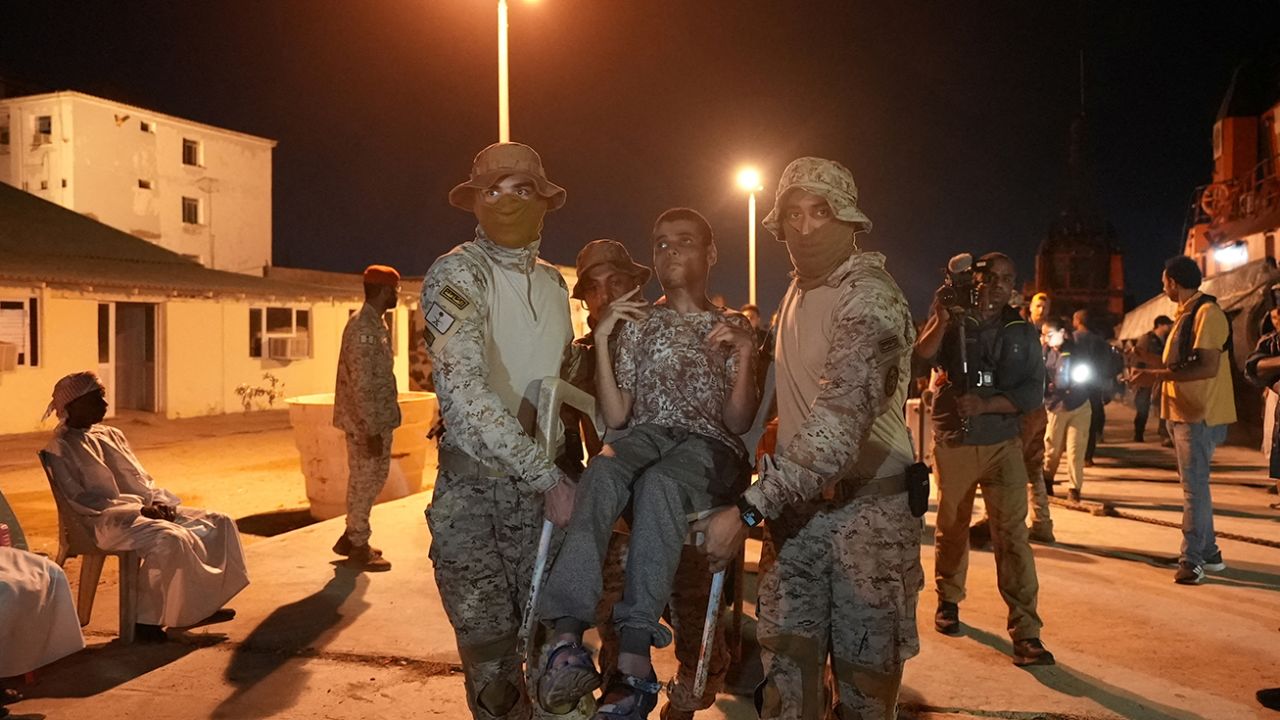
Under floodlights, a tugboat docks and picks up dozens of evacuees from a quiet street near the busy jetty. Saudi soldiers wearing balaclavas check their passports and let them through, bringing them one step closer to safety.
They are among thousands who have fled since deadly fighting erupted in Sudan between rival military forces more than two weeks ago, making the treacherous 830-kilometer journey from the capital to the eastern port in the hope of boarding a ship to safety.
CNN joined a Saudi evacuation mission Sunday from Jeddah to Port Sudan and back across the Red Sea – a route that’s become a lifeline for those whose lives have been upended by the conflict, some of whom left with just a passport and a few personal items.
Sudanese-American businessman Adil Bashir was one of just 52 evacuees who boarded the Royal Saudi Navy ship HMS Al-Diriyah on Sunday. He told CNN he fled Khartoum after his car dealership was attacked and some of his vehicles were stolen and others burnt. “There are a lot of dead bodies on the street,” he said.
Hundreds have been killed and thousands wounded in the fighting. Thousands of foreign nationals have been evacuated from the country, while many Sudanese remain stuck in ever more deteriorating and deadly conditions.
And as fighting has driven more people out of Khartoum, Port Sudan has become a key evacuation hub.
The UN’s internationally-recruited staff have relocated to the eastern city and thousands are in a holding pattern, hoping for flights out. At least two convoys of private US citizens and local staff of the US Embassy arrived over the weekend, adding to the numbers.
As of Sunday, the Saudis said they had evacuated 5,197 people of 100 nationalities from the country.
“The assets and the capabilities – both military and civilian – in Saudi are involved in taking civilians from Sudan,” Defense Ministry spokesman General Turki Al-Maliki told CNN. “As long as it’s safe, we’ll keep doing our role.”

Voyage to safety
The evacuees were welcomed aboard the HMS Al-Diriyah with flowers, chocolates, bottles of water and packed orange juice.
“It’s very hard and very painful for me [to leave] because Sudan is like a second home,” Pakistani migrant worker Hamza Navid told CNN.
He acted as the unofficial translator for his colleagues on the team, listening to instructions in English from the crew and relaying it in Urdu. Others in the group were from countries including Oman and Nepal, all connected in a sad goodbye to Africa’s third- largest nation.
The journey from Port Sudan to Jeddah can take up to 12 hours depending on sea conditions. Though the Saudi Royal Navy fleet is shuttling back and forth across the Red Sea, demand far outstrips supply.
But every new arrival in Jeddah is a ceremony with uniformed officers lining up outside a vessel to welcome the evacuees and officials on hand for photo opportunities. It is also a well choreographed media spectacle with dozens of cameras pointed at weary travelers as they disembark. Sometimes, there are tears – equal parts relief and survivors’ guilt.

Ahead of the ship’s arrival in Saudi Arabia, the Sudan Armed Forces (SAF) said Sunday it had agreed to extend a US-Saudi mediated ceasefire for 72 hours after its rival, the paramilitary Rapid Support Forces (RSF), earlier agreed to extend the truce.
Despite multiple ceasefires however, sporadic clashes between the two groups have continued and gunfire was heard on Sunday and Monday near the closely contested presidential palace in Khartoum, witnesses told CNN.
Eight tons of medical aid arrived in Sudan on Sunday, the International Committee of the Red Cross said in a statement, offering relief to the country’s hard-hit medical facilities.
But experts say the country is at risk of a humanitarian disaster, as those still trapped in their homes face shortages of food, water, medicine and electricity.
“The number of dead bodies scattered around the streets is mounting, and this is creating an environmental catastrophe,” the Sudan doctors’ union said in a statement Sunday.
The statement by the Preliminary Committee of Sudan Doctors called for a stop to the “war” and the establishment of humanitarian corridors for medical aid, ambulances, patients and health personnel.
There is also dire situation at the Walfa Hadia border crossing between Egypt and Sudan, with several deaths reported from dehydration, it added.
Additional reporting by CNN’s Muhammad Darwish, Fabien Muhire, Eyad Kourdi, Aaron Pellish and Sahar Akbarzai.



